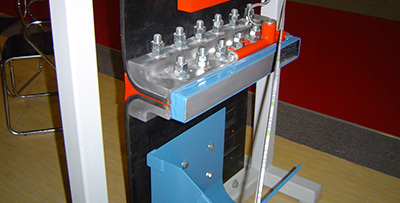News Center
Hezi technology focuses on the research and development of "rapid seamless conveyor belt joint sleeve" innovative technology project

NEWS CENTER

News Details
Unlocking the Potential of Steel Core Conveyor Belts in the Chemical Industry
Release time:
2025-06-16
In the chemical industry, the transportation of materials is a critical component of production workflows. One of the most robust and reliable solutions for this task is the steel core conveyor belt. These belts are designed to withstand extreme conditions, making them particularly suitable for handling heavy loads and abrasive materials typically found in chemical processing facilities. Steel cor
In the chemical industry, the transportation of materials is a critical component of production workflows. One of the most robust and reliable solutions for this task is the steel core conveyor belt. These belts are designed to withstand extreme conditions, making them particularly suitable for handling heavy loads and abrasive materials typically found in chemical processing facilities.
Steel core conveyor belts are constructed with a steel reinforcement layer that provides exceptional tensile strength. This feature is paramount in environments where heavy and sharp materials are transported, as it prevents excessive wear and tear that could lead to costly downtimes. The integration of steel cores allows these belts to maintain their structural integrity under high-stress conditions, which is frequently encountered in the chemical industry.
Moreover, the efficiency of steel core conveyor belts cannot be overstated. Unlike traditional rubber belts, which can stretch and deform over time, steel core belts resist elongation, ensuring consistent performance. This reliability translates to more predictable operational timings, allowing chemical plants to optimize their production schedules and improve overall productivity. Additionally, these belts can handle a wide variety of chemical products, from powders and granules to liquids, showcasing their versatility in different applications.
One of the key advantages of using steel core conveyor belts is their long lifespan. Due to their robust construction, they require less frequent replacements compared to standard conveyor belts. This longevity not only reduces the cost associated with belt replacements but also minimizes disruptions in the production process. In an industry where time is money, the durability of steel core belts is a significant asset.
Furthermore, safety is a paramount concern in the chemical sector, and steel core conveyor belts contribute positively in this regard. Their ability to withstand high temperatures and resist chemical exposure makes them a safer option for transporting hazardous materials. Properly maintained steel core belts can help prevent accidents caused by belt failures, thereby enhancing workplace safety.
In summary, steel core conveyor belts are an invaluable resource in the chemical industry's material handling processes. Their strength, durability, efficiency, and safety features make them a preferred choice for many companies seeking to improve their operational capabilities. As the industry evolves and demands increase, the adoption of advanced conveyor systems, such as those utilizing steel core technology, will likely become even more prevalent. Understanding the benefits of these belts can assist professionals in making informed decisions that enhance productivity and safety in their operations.
Steel core conveyor belts are constructed with a steel reinforcement layer that provides exceptional tensile strength. This feature is paramount in environments where heavy and sharp materials are transported, as it prevents excessive wear and tear that could lead to costly downtimes. The integration of steel cores allows these belts to maintain their structural integrity under high-stress conditions, which is frequently encountered in the chemical industry.
Moreover, the efficiency of steel core conveyor belts cannot be overstated. Unlike traditional rubber belts, which can stretch and deform over time, steel core belts resist elongation, ensuring consistent performance. This reliability translates to more predictable operational timings, allowing chemical plants to optimize their production schedules and improve overall productivity. Additionally, these belts can handle a wide variety of chemical products, from powders and granules to liquids, showcasing their versatility in different applications.
One of the key advantages of using steel core conveyor belts is their long lifespan. Due to their robust construction, they require less frequent replacements compared to standard conveyor belts. This longevity not only reduces the cost associated with belt replacements but also minimizes disruptions in the production process. In an industry where time is money, the durability of steel core belts is a significant asset.
Furthermore, safety is a paramount concern in the chemical sector, and steel core conveyor belts contribute positively in this regard. Their ability to withstand high temperatures and resist chemical exposure makes them a safer option for transporting hazardous materials. Properly maintained steel core belts can help prevent accidents caused by belt failures, thereby enhancing workplace safety.
In summary, steel core conveyor belts are an invaluable resource in the chemical industry's material handling processes. Their strength, durability, efficiency, and safety features make them a preferred choice for many companies seeking to improve their operational capabilities. As the industry evolves and demands increase, the adoption of advanced conveyor systems, such as those utilizing steel core technology, will likely become even more prevalent. Understanding the benefits of these belts can assist professionals in making informed decisions that enhance productivity and safety in their operations.

Recommend News





























